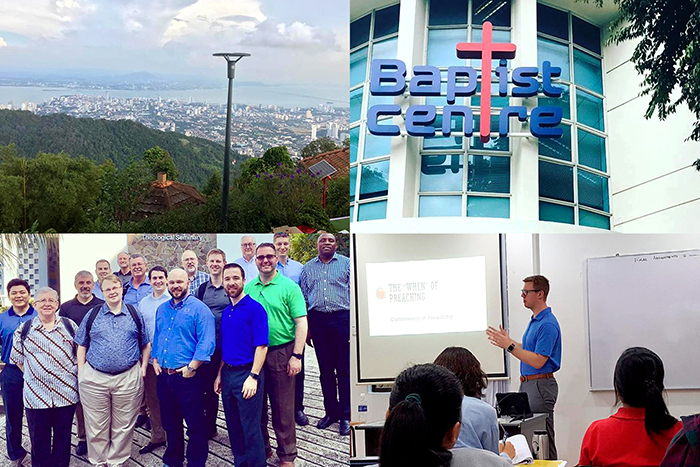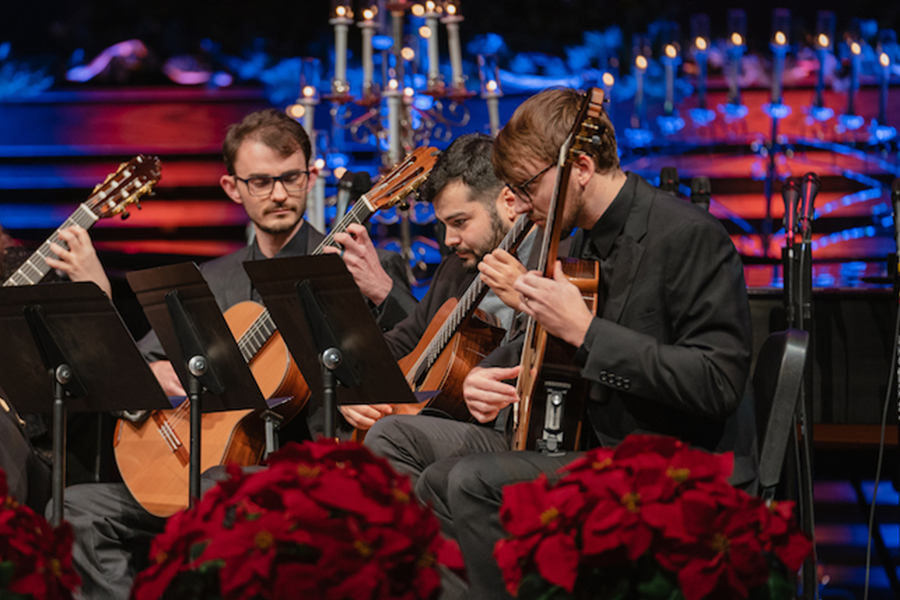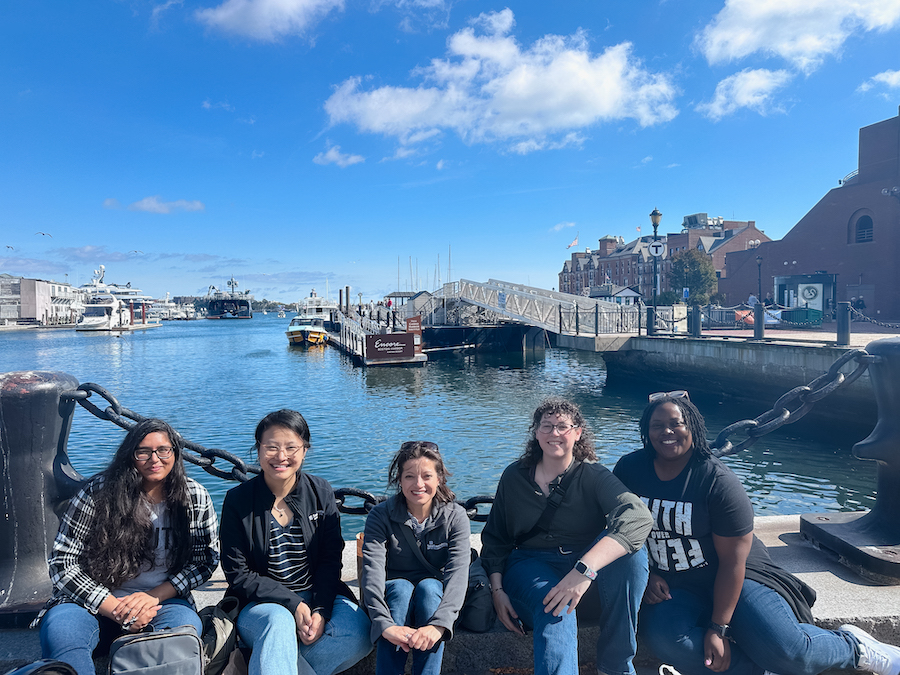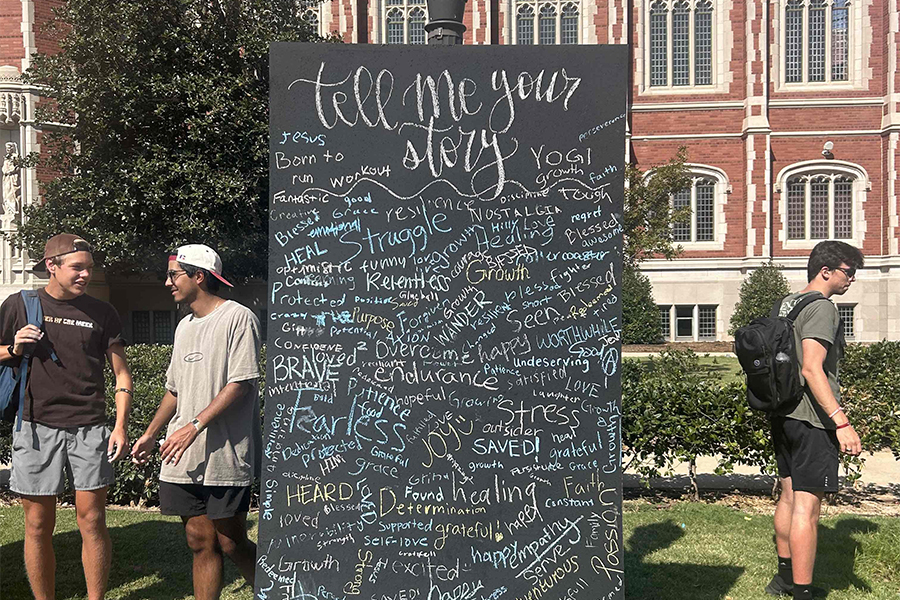Ph.D. students use teaching opportunity to spread the Gospel

On his way back from lunch to a seminary in Southeast Asia, Anthony Svajda sat in the front seat of the car next to his Uber driver, Wilson. From there, Svajda, a Ph.D. student at Southwestern Seminary, noticed a small wooden cross hanging from Wilson’s rear view mirror.
Svajda and the other Southwestern students with him asked Wilson if he was a Christian. He informed them that he had been attending a Methodist church but had not yet been baptized.
Sensing that Wilson did not fully understand the Gospel message, Svajda clarified that, according to Scripture, baptism does not save; only Jesus saves. “I took him through a few Scriptures to show him that the Bible calls us to call out to Jesus for salvation, and he was immediately convicted,” Svajda says.
“As we were then pulling into the seminary,” he continues, “I asked if he believed this truth and if he would like to pray to receive salvation from Jesus. He enthusiastically said that he was ready. So he called out to the Lord right then in the car. I am sure that was an Uber drive that he will never forget!”
This Gospel encounter was one of many experienced by 12 Southwestern Ph.D. students during a visit to a Southeast Asian seminary, Jan. 5-15. The purpose of the trip was to provide the students an opportunity to teach in a context outside the West where Christianity is beginning to flourish, which further strengthened Southwestern’s ties with the Southeast Asian seminary. But beyond teaching a class at the seminary on a rotation basis throughout each day, the students were intentional in devoting their evenings to sharing the Gospel with those whom they encountered.
L.R. Scarborough Chair of Evangelism Matt Queen, who supervised the students alongside Southwestern professors Keith Eitel and Dean Sieberhagen, says, “The mission of Southwestern is to preach the Word and reach the world. And as our former president Robert Naylor used to say, the sun never sets on Southwestern. So while Southwestern students were in Southeast Asia, we wanted to make sure that the sun didn’t set without Southwesterners preaching the Word and reaching the world.”
Students took advantage of each of their encounters, witnessing to their Uber drivers and those they met at restaurants during meals. The professors also engaged in intentional conversations, witnessing to the bus drivers they had hired for the week, answering their objections to Christianity and moving them closer and closer to making the decision to know Jesus Christ.
Ph.D. student David Norman had a fruitful conversation with Mohd, a Muslim Uber driver. After briefly sharing about their families—Norman has five children and Mohd, three—Norman mentioned how important it is to him to explain his faith to his children. He then asked how Mohd explains his faith to his children.
“He mentioned reading the stories of the 25 prophets to them at bedtime and teaching them to pray,” Norman says. “After his explanation, I proceeded to share the Gospel in as succinct and clear a manner as possible. Of course, as a Muslim, he recognized the name of Jesus and mentioned that Jesus was his prophet, too.”
Norman began to probe Mohd’s understanding of Jesus “the prophet,” asking if a prophet could lie or teach something false. Mohd confidently asserted that prophets neither lie nor teach falsehoods. “With that understanding,” Norman says, “I asked him what he made of Jesus’ having claimed to be God. He, of course, did not believe Jesus to be one with God and denied that He could have been.”
Using an argument learned from C.S. Lewis, Norman contended that Jesus could not merely have been a prophet. Based on what He said in Scripture, Norman said, Jesus was either “a liar who taught falsehoods, a lunatic who believed himself to be God, or He was exactly who He claimed to be and should be worshiped as the Son of the living God.”
Visibly shaken by this reasoning, Mohd could not justify how Jesus could still be a mere prophet in light of Jesus’ claim to be God. After Mohd noted that he learned this teaching from his father, Norman returned to the subject of parental responsibility in matters of faith.
“I asked him how important it was to him to teach his children the truth,” Norman says. “He affirmed how critical it was, as children will largely believe what their fathers teach them. In that case, I asked, how great a responsibility to our children do we as fathers have to ensure that the faith that we teach them is true? If our children’s eternities hang in the balance, how critical is it that we be certain?”
Mohd agreed that such a responsibility is, indeed, great. Unfortunately, by then, they had arrived at Norman’s destination. Norman thanked Mohd for the ride and then encouraged him to search for what is true, not only for his own sake, but also for the sake of his children.
“I wish the story had a better ending,” Norman reflects. “I would rather he responded immediately to the Gospel in faith and repentance, but as it stands, I find solace in the fact that the seed of the Gospel had been sown. My prayer is that it takes root for the sake of our driver and his family.”
In light of such evangelistic experiences, Queen, speaking on behalf of the professors, says, “We were so proud of how these scholar students did in the classroom, but also in their conversations with many Muslim, Hindu and so-called Christians. … And that some of the ways in which they engaged the Gospel entailed using what they’ve learned in the Ph.D. program here at Southwestern was just a nice exceeding of the expectations.”



